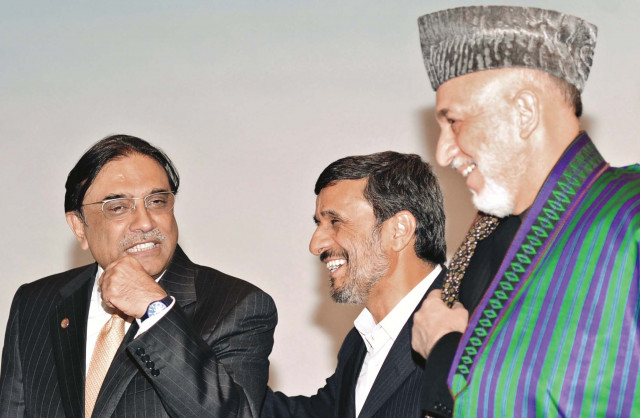Economic Coordination Organisation: Regional summit amid disappointment, hope
President says Pakistan can provide trade, communication corridors.

While addressing the 11th summit of the ECO, President Asif Ali Zardari said Pakistan could provide trade and communication corridors through its territory.
He described development as a strategic priority and urged member states that infrastructure and energy connectivity in the region should be one of the key goals. He added that one of the major achievements of the ECO was the enforcement of Transit Transport Framework Agreement (TTFA). The president added that the Islamabad-Tehran-Istanbul train service should start its operation.
President Zardari said that the ECO has a lot of potential and urged member countries to pool resources. The ECO states have the capacity to collectively address their needs and be masters of their own destiny, the president said, adding that since its establishment, the ECO had matured and progressed.
He said, “Vision 2015, which developed five years ago, is a pragmatic roadmap and since then, the ECO has achieved a lot. However, we still have a long way to go to exploit the true potential of the region.”
He said Pakistan has already signed and ratified the Economic Cooperation Organisation Trade Agreement (Ecota). Pakistan and Turkey have recently agreed to his agreement, and I urge other members, who have not yet done so, to become parties to this agreement, he said. “Free trade is central to regional economic integration,” the president said.
President Zardari added that the ECO Trade and Development Bank needed to be turned into a vibrant financial institution and a vehicle for project development. He said the ECO states should work together to protect their economies from the volatility of international markets and the protectionist and discriminatory policies.
On Afghanistan, the president said Pakistan is committed to working closely with the ECO member countries and the international community for stability, peace and development of the country.
Meanwhile, in his opening speech, Turkish President Abdullah Gul lamented that the group was faltering in efforts to expand commercial links, stressing intra-regional trade had increased only from six to seven per cent since 2005, undermining the 2015 target of 20 percent. “We have to admit that this is a failure,” he said, urging member states to speed up efforts to adopt an ECO accord calling for progressive removal of trade barriers.
“It should be understood that the way to economic stability and sustainable development for our countries goes through economic and commercial cooperation in the region,” he said.
Thursday’s summit was also attended by presidents Hamid Karzai of Afghanistan, Ilham Aliyev of Azerbaijan, Roza Otunbayeva of Kyrgyzstan and Emomali Rahmon of Tajikistan, as well as Kazakh Prime Minister Karim Masimov.
The ECO, which promotes regional trade and economic development, also includes Turkmenistan and Uzbekistan, which sent lower-level officials. Iraqi President Jalal Talabani participated as a guest.
On the sidelines of the summit, the foreign ministers of Turkey, Iran and Azerbaijan issued a joint statement pledging to enhance political consultations and hold regular trilateral meetings.
The 10 member states cover an area of about eight billion square kilometres, rich with natural resources, and represent some 400 million people.
Published in The Express Tribune, December 24th, 2010.



















COMMENTS
Comments are moderated and generally will be posted if they are on-topic and not abusive.
For more information, please see our Comments FAQ